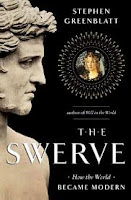Was the re-discovery of a thousand-year-old poem the catalyst that caused the shift from medieval Europe to Renaissance? Stephen Greenblatt starts with Poggio Bracciolini (a 15th century book hunter that brought the webcomic Family Man to mind) who located a long-lost copy of On the Nature of Things by Lucretius in a remote German monastery. Lucretius recorded some mighty powerful ideas.
What was so startling - and dangerous - about the very long poem by Lucretius? Greenblatt writes that "On the Nature of Things is that rarest of accomplishments: a great work of philosophy that is also a great poem." It contained subversive ideas on politics, ethics and theology, including these elements:
1. "Everything is made of invisible particles." (atoms)
2. "The elementary particles of matter are eternal."
3. "All particles are in motion in an infinite void."
4. "Everything comes into being as a result of a swerve."
5. "The swerve is the source of free will."
6. "Nature ceaselessly experiments."
7. "The universe was not created for or about humans."
8. "Humans are not unique."
9. "The soul dies."
10. "There is no afterlife."
11. "All organized religions are superstitious delusions."
12. "Religions are invariably cruel."
13. "There are no angels, demons, or ghosts."
14. "The highest goal of human life is the enhancement of pleasure and the reduction of pain."
15. "The greatest obstacle to pleasure is not pain; it is delusion."
16. "Understanding the nature of things generates deep wonder."
It took me about 100 pages to get sucked in by the narrative. Even before that, however, I enjoyed quotes like that of a 4th century historian complaining that "people were driving their chariots at lunatic speeds through crowded streets." In the end, I found The Swerve's blend of philosophy and history to be thought-provoking as well as entertaining.

No comments:
Post a Comment